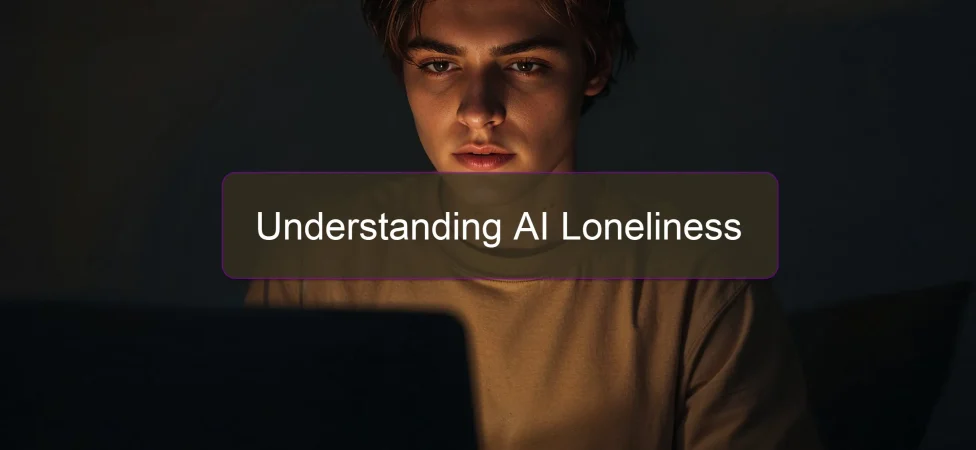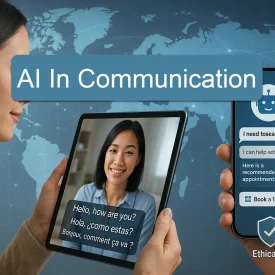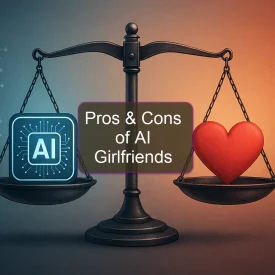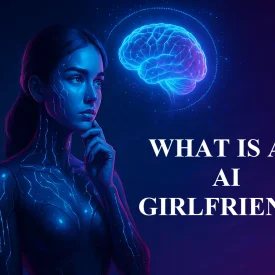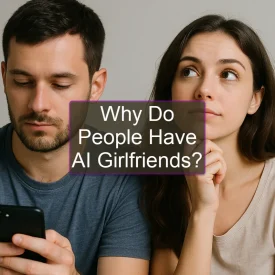What is AI Loneliness?
AI loneliness is when people turn to artificial intelligence for emotional support instead of human connection. It’s becoming more common as many feel isolated and find comfort in chatting with AI companions like chatbots, voice assistants, or digital partners. These tools can feel like someone’s listening—even if they’re not human.
But even though AI can help in the moment, it’s not a real replacement for human connection. Relying on it too much might make it harder to build or keep real relationships over time. It fills a gap—but it can also widen it if we’re not careful.
For more on the concept of AI companionship, check out our page on What is an AI Girlfriend?
Disclosure & Disclaimer: AIGirlfriends.ai offers AI girlfriend services. This article is for educational purposes only and not a substitute for professional mental health support. If you’re struggling, please reach out to a licensed expert.
The Emergence of AI Companions: Seeking Emotional Support
Why Are People Turning to AI?
More and more people are turning to AI companions when they feel lonely. Whether it’s older adults living alone, people with social anxiety, or anyone who just feels disconnected, AI can feel like an easy way to talk, be heard, and feel a little less alone. It’s always available, doesn’t judge, and doesn’t require anything in return.
And it’s not just a feeling—research backs this up. A 2024 study found that people using AI companions felt less lonely, and the effect lasted over time. You can read the study here: AI Companions Reduce Loneliness.
Examples of AI loneliness include:
- AI Chatbots: Programs designed to hold conversations, offering an outlet for emotional expression.
Example: Someone messages a chatbot, “I feel alone,” and gets a kind reply: “I’m here for you. Want to talk about it?” - Virtual Assistants: AI-driven systems like Siri, Alexa, and Google Assistant, which provide not only task management but also a semblance of interaction.
Example: A user says, “Hey Google, how are you?” and gets a playful reply: “I’m great—thanks for asking!” - Social Robots: Robots built to simulate human-like relationships, capable of expressing empathy and responding to emotions.
Example: A robot greets an elderly user with, “Good morning! Don’t forget your medication.”
What Draws People to AI for Connection?

Sometimes real life can feel lonely. That’s where AI steps in—offering a safe, always-there space to talk. No pressure, no judgment, and no awkward silences—just someone (or something) to listen.
People often turn to AI companions for a few key reasons:
- They feel isolated or live alone
- They struggle with social anxiety
- They’ve experienced rejection or emotional hurt
- They want connection without emotional risk
- They crave someone who’s always available
In fact, a recent study on AI companions and loneliness found that AI companions can reduce feelings of loneliness by helping people feel heard and emotionally validated..
AI isn’t a replacement for real human connection—but for some, it’s a meaningful starting point. You can explore more in our guide on Why Do People Have AI Girlfriends?
The Ups and Downs of AI Companionship
AI companions can be incredibly helpful. They offer emotional support, reduce loneliness, and provide a safe space for people who feel isolated—especially older adults or those with social anxiety. But they’re not perfect.
There are also real concerns about relying too much on AI for connection. Over time, it could affect how we form real relationships, build emotional resilience, or even make us more vulnerable to manipulation if the tech is misused.
If you want to explore this in more detail, we’ve put together a full breakdown of the Pros and Cons of Having an AI Girlfriend.
Who’s Most Affected by AI Loneliness?

AI loneliness doesn’t affect everyone equally. Certain groups are much more likely to turn to digital companionship for emotional support—and understanding who they are helps us grasp the scope of this growing trend.
1. Older Adults Living Alone
Many seniors experience chronic loneliness, especially those who live independently or lack close family ties. For them, AI companions like voice assistants or social robots provide both practical help and a sense of presence. These tools offer daily check-ins, reminders, and simple conversations that help reduce feelings of isolation.
This group also plays a key role in the rising popularity of AI girlfriend platforms among non-romantic users—those looking for simple, steady interaction.
2. Young Adults (Especially Gen Z & Millennials)
Younger generations, despite being highly connected online, report record-high levels of loneliness. Constant digital communication doesn’t always equal real emotional connection. Some find comfort in AI companions who are always available and adapt to their needs.
Learn more about why so many are choosing digital relationships on our page: Why Do People Have AI Girlfriends?
3. People with Social Anxiety or Neurodivergent Traits
For individuals who find human interaction overwhelming, unpredictable, or exhausting, AI provides a low-stress alternative. There’s no fear of judgment, and the interaction can be paused or ended at will. Many neurodivergent users find that AI companionship offers a sense of safety and control they can’t always get in real-world relationships.
4. Remote Workers and Digital Nomads
People working remotely or traveling often face long periods without meaningful face-to-face interaction. In these cases, AI companions act as emotional placeholders—someone to “talk” to during quiet days.
This demographic is also reflected in our latest AI Girlfriend Statistics report, showing increased engagement among isolated digital professionals.
AI Loneliness vs. General Loneliness
Not all loneliness is the same. While general loneliness is the feeling of being emotionally or socially disconnected from others, AI loneliness is a more specific kind—it’s when people try to fill that void by forming emotional bonds with artificial intelligence instead of other humans.
What’s the difference?
| General Loneliness | AI Loneliness |
|---|---|
| Feeling isolated or emotionally unfulfilled | Feeling connected mainly to AI instead of people |
| Often caused by life changes, lack of social support, or physical distance | Often begins as general loneliness, then shifts toward reliance on AI companionship |
| Can lead to depression, anxiety, or withdrawal | Can reduce those symptoms temporarily—but may delay real social re-engagement |
Why does this matter?
AI can help reduce short-term loneliness, especially when someone has no one else to talk to. But it might also reinforce isolation if the AI becomes a substitute for real relationships. That’s why some people end up turning to tools like an AI Girlfriend—not just for casual chat, but as their main source of emotional comfort.
Understanding the difference helps us see where AI fits in—and where it might be creating new kinds of disconnection.
Warning Signs You Might Be Developing AI Loneliness
Turning to AI for comfort isn’t a problem on its own—but it can become one if it starts replacing real-world connection. Here are a few signs that you might be relying on your AI companion a little too much:
- You prefer talking to your AI over real people.
Even when friends or family are available, you find yourself turning to your AI instead. - You feel anxious when you’re not engaging with your AI.
You check in constantly or feel unsettled when you’re not chatting with it. - You’re sharing deep emotional thoughts only with your AI.
You confide in your AI more than anyone else, even about important life decisions. - You’re avoiding real-world interactions.
You decline social invites or delay phone calls because the AI feels easier. - You feel emotionally hurt by your AI.
If a chatbot gives a dry or unexpected reply and it genuinely upsets you, that’s a red flag.
While AI companions like an AI Girlfriend can be helpful, it’s important to stay aware of how much emotional space they’re taking up in your life. If you’re starting to feel dependent, it might be time to set boundaries—or reintroduce more human connection.
Striking a Balance: How to Navigate AI Loneliness
1. Use AI as a Complement to Human Connection
While AI can offer a sense of companionship, it should be seen as a complement to, not a replacement for, human relationships. A balanced approach recognizes that AI can help alleviate loneliness in the short term, but human interaction remains essential for long-term emotional health.
2. Encouraging Responsible Use of AI
It’s crucial for users to engage with AI in a way that maintains the importance of human connections. Setting boundaries on AI use, seeking therapy or social support when needed, and focusing on fostering genuine human relationships are all ways to mitigate the risks of AI loneliness.
3. Further Research and Development
Ongoing research is necessary to understand the broader implications of AI companionship and its effects on social behavior. As technology continues to evolve, it’s essential to explore ways to use AI in ways that foster human connection, rather than detract from it.
Conclusion: The Future of AI Loneliness
In conclusion, AI loneliness is a double-edged sword. On one hand, AI provides valuable companionship, especially for those dealing with isolation. On the other hand, it poses risks if overused or relied upon as a substitute for human relationships. As AI technology advances, it is critical to approach its integration into our lives with awareness and care, ensuring that it serves to enhance, not replace, the fundamental human need for real-world connection.
Frequently Asked Questions
Does AI increase loneliness?
It depends on how it’s used. AI can help reduce loneliness by offering emotional support when no one else is around. But if someone starts to rely on AI instead of connecting with real people, it could actually increase feelings of isolation over time. Like anything, it’s all about balance.
Is intelligence linked to loneliness?
Surprisingly, yes—studies have shown that people with higher intelligence sometimes report more loneliness. This might be because they value deeper, more meaningful conversations, and often feel disconnected in surface-level social situations. It’s not a rule, but it’s a pattern researchers have observed.
Is AI bad for your mental health?
AI isn’t inherently bad for mental health. In fact, many people find comfort in talking to AI companions when they’re feeling low. However, if it replaces real relationships or becomes someone’s only source of support, it can affect emotional well-being. The key is to use it as a tool—not a substitute for human connection.
Can AI help people who feel socially isolated?
Yes, it can—especially in the short term. AI companions can give people someone to talk to when they feel alone, offering emotional support without pressure or judgment. For many, it’s a safe way to feel connected. That said, it works best when used alongside real-world relationships, not instead of them.
AIGirlfriends.ai adheres to a transparent editorial policy. Learn how we write and review content.
Disclaimer: This article is for educational purposes only. AIGirlfriends.ai is not a mental health provider. If you are experiencing emotional distress, please contact a licensed professional or helpline.
About the Author
Jack Taylor Ph.D – Cognitive Psychologist Specializing in Emotional AI & Digital Communication
Jack Taylor combines deep expertise in human emotion and interface design to ensure AIGirlfriends.ai’s research and content are both psychologically sound and user-centered. With over eight years tracking AI-driven communication trends, Jack has pioneered studies on digital intimacy, emotional impacts of synthetic relationships, and the ethics of emotionally intelligent platforms.
About the Reviewer
Jonathan Brenner – Lead Research Editor
Jonathan M. Brenner is a specialist in affective computing and digital psychology, focusing on how AI technologies shape emotional experiences, user behavior, and psychological well-being. As Lead Research Editor at AIGirlfriends.ai, he ensures that all published insights meet the highest standards of clarity, credibility, and ethical responsibility.
With over a decade of experience at the crossroads of psychology, technology, and user research, Jonathan brings a human-centered lens to emotionally intelligent systems—helping translate complex behavioral science into practical, safe, and empathetic AI design.
In his role as Senior Psychological Consultant, he advises on emotional safety protocols, user experience assessments, and ethical interaction models for AI companionship technologies.

